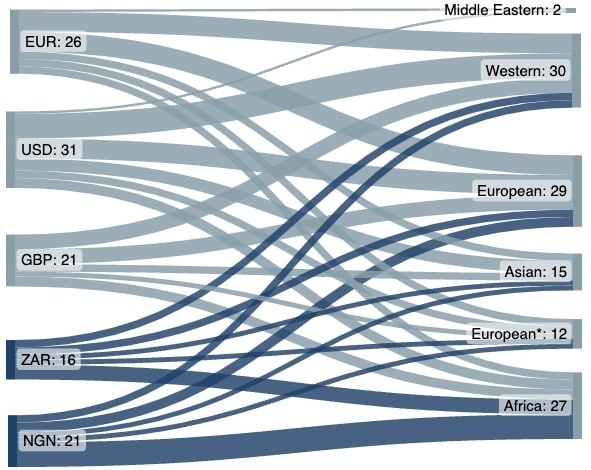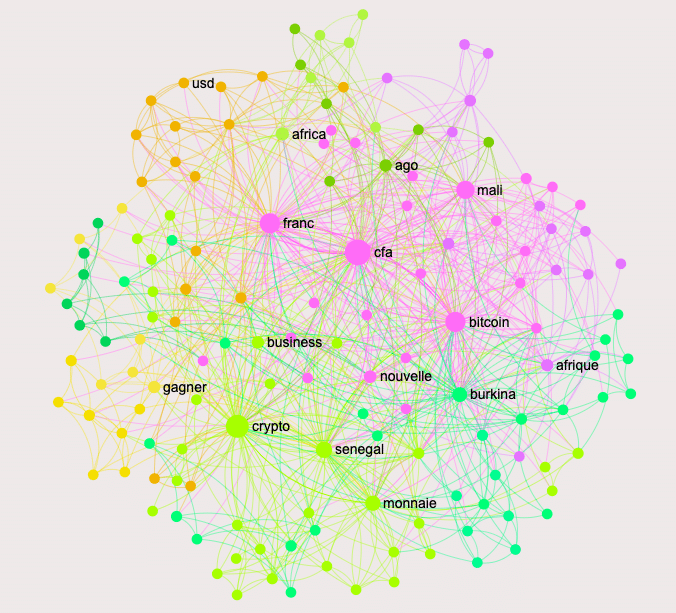Africa’s natural turn to what seemed to be a safe haven for militarily battled and an economically worn-out continent turned out to be a serendipitous weapon of influence in the hands of two strategic rivalries – Russia and France. The availability of large amounts of publicly-available data on virtual currency adoption in French Africa provides an unprecedented opportunity to investigate key narratives through data analysis in a social context. Behind this overall uptick in online activity in the sub-continent, there are persistent political and ideological efforts run by foreign-linked influencers and malign personas. On major social networking sites, roughly 2 in 5 West African netizens are engaged in conversations promoting Bitcoin and other virtual currencies as a strategic replacement to the France-backed CFA France.
Observations
Since April 2022, thousands of French-language articles and social media posts promoted the introduction of digital cryptocurrencies as a viable replacement to the CFA Franc in West Africa. The adoption of Bitcoin as a legal tender by the Central African Republic in March 2022, coupled with Russia’s geopolitical advances in both Mali and Burkina-Faso, steered the information environment towards more hostility against France and its monetary system in Françafrique. Our investigation of 2,420 documents published since April unveiled a sophisticated activity aimed at elevating grassroots adoption of virtual currencies in the African sub-continent in an effort to undermine the CFA. Accordingly, we hypothesized an inquiry to examine any external or inauthentic influence on the African populace’s move towards a decentralized ledger. This report does not address a hypothesized correlation between the hyped social media activity and the availability of foreign-managed crypto exchanges like KuCoin and OKEX; however, we aim to illustrate the environment in which foreign players can exert influence on the creation of a domestically-run blockchain communities through information operations.
Today, the African cryptocurrency market represents the fastest growing grass-root blockchain community in the world, yielding a 1,200% annual increase in exchanged crypto value. This rapid march towards cryptoization is primarily driven by political and economic instability, low trust in government, and high traditional banking fees. The region is also lucrative for crypto services offering a wide variety of currency swap options, 32% of which are Africa-based exchanges according to a sample of 50 exchanges popular in the continent. Unlike the majority of European exchanges, which amount to 22% of the sample, domestically-originating exchanges support peer-to-peer (P2P) transactions in local African currencies by design, offering seamless and unlimited transfer of funds across the continent.

While cryptoization is often linked to and mirrored in the African information environment through the advocacy of domestic and diaspora Africans, our inquiry has revealed that a prominent proportion of this activity is conducted by personas emulating the activity of domestic voices and playing an instrumental role in collectively framing crypto adoption as a method of opposition to France and its past colonial rule. Text analysis of Facebook content published in the second and third quarters of 2022 indicates that 53% of public cryptocurrency content featured postings denouncing the FCFA and the proposed e-FCFA, while around 2% of crypto promotions highlighted the digital alternative as a tool to evade financial sanctions. On Twitter, 25% of cryptocurrency conversations belonged to threads discussing the adoption of Bitcoin as an alternative to FCFA, while 31% of discussions indiscriminately advocated for establishing a decentralized ledger across Benin, Mali, and Senegal. Russia-aligned African influencers, such as Kemi Seba and Sega Diarrah, lead a significant proportion of these discussions and outproduce organic content generated by netizens.

On YouTube, 16% of cryptocurrency conversations directly related to calls for adopting cryptocurrency in lieu of the CFA, and overall featured other unrelated discussions with a negative sentiment rate of 86% based on BERT AI model, including video broadcasts pertaining to a series of anti-France demonstrations that took place in Bamako between January and July of 2022. For instance, Iran-funded Press TV streamed a talk show in which Bitcoin was depicted as a valid consideration in post-Barkhane Mali during a discussion of the withdrawal of the last French troops from Mali.
As a counter-measure, the French media has consistently amplified narratives pertaining to the hidden risks associated with cryptoization, including terror finance, money laundering, sanctions evasion, and the enablement of paramilitary forces such as the Wagner Group. This goes in line with global concerns about the dual-affiliation of shadow crypto exchanges, where a number of platforms, while registered in independent territories, are linked to foreign states such as Russia.
Looking Forward
Rapid cryptocurrency adoption on the African continent could be described as a fusion of an organic demand for stability and thriving anti-French Pan-Africanism, where both make an attainable environment for manipulation amid the Russia-France rivalry. In light of current global economic instability, this natural model could unequivocally be leveraged by adversaries way beyond the boundaries of the African continent.






